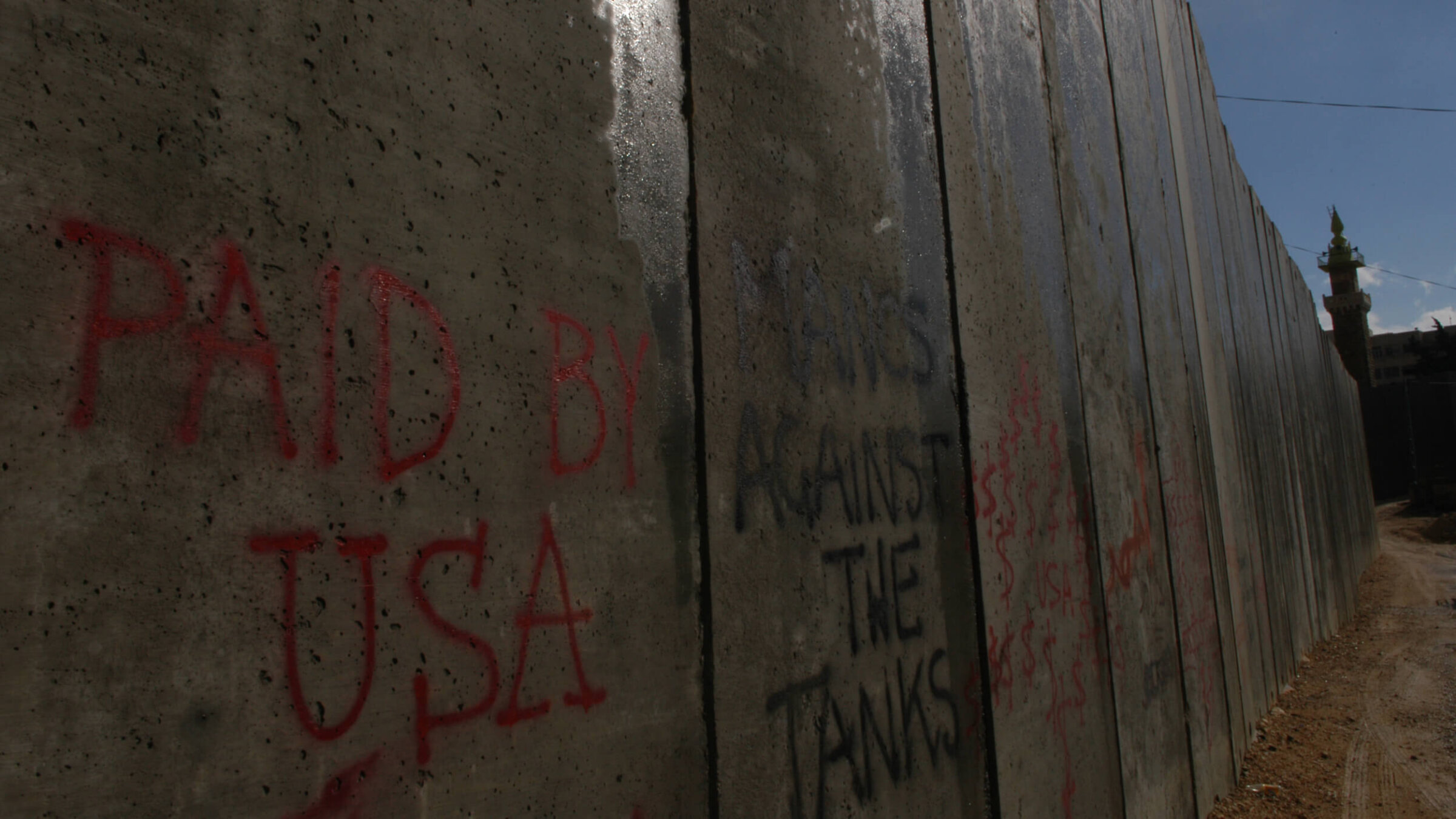Trump is forcing liberal Zionists to confront an extraordinarily inconvenient truth
If the US is really abandoning a two-state solution, that means an uncomfortable reckoning for most American Jews

“Paid by USA,” is sprayed on the concrete separation wall between the Palestinian city of Abu Dis and Israel. Photo by Shaul Schwarz/Getty Images
Did President Donald Trump’s administration just reverse decades of precedent when it comes to Israel?
In what The New York Times characterized as a “sharp shift away from decades of American foreign policy on the Israel-Palestinian conflict,” Mike Huckabee, Trump’s ambassador to Israel, this week suggested in two interviews that under Trump, the U.S. no longer aims for the creation of Palestinian state bordering Israel in the West Bank and Gaza.
Huckabee’s pronouncements, which apparently took his superiors at the State Department by surprise, represent a significant rhetorical shift. Ever since that emotional day in September 1993 when then-President Bill Clinton, Israeli Prime Minister Yitzhak Rabin and Palestinian Liberation Organization leader Yassir Arafat grasped hands on the White House lawn to announce a promised end to the conflict, official statements by United States presidents, secretaries of state and ambassadors in the region have paid tribute to the goal of the creation of a peaceful, likely demilitarized Palestinian state in the West Bank and Gaza.
Yet save for extremely brief moments during Clinton’s administration, and that of former President Barack Obama after him, no U.S. president or his representative since President Jimmy Carter has been willing to go head-to-head with Israel to demand the kinds of concessions to the Palestinians that would make such a state politically or economically viable.
Huckabee’s statement is therefore perhaps most valuable for the purpose of realism, because it articulates the de facto U.S. support for what might be fairly called Israel’s “one-state solution” via its domination of all lands “from the river to the sea.”
Tellingly, the State Department did not disavow Huckabee’s words. Instead, it passed the buck, with a spokesperson telling a Times reporter, “When it comes to American policy and certainly where the president stands, I’d suggest you call the White House.”
That “one-state solution” has long been de facto Israeli policy, too. Since former Prime Minister Yitzhak Rabin’s Nov. 4, 1995, assassination by a right-wing Israeli extremist led to the 1996 election of his right-wing rival, current Prime Minister Benjamin Netanyahu, almost all Israeli prime ministers have participated in a set of policies designed to make the goal of a Palestinian state ever more difficult to achieve. (Netanyahu’s own Likud Party first endorsed a one-state solution in its 1977 platform.)
They’ve signed off on expropriating land for more Jewish settlements in the West Bank, and turned a blind eye to Israeli settler terrorism there, designed to force Palestinians from their homes. And even though Israel’s occupation of Gaza ended in 2005, before the current war, its blockade on the strip — which has been in place since 2007 — and occasional covert support of Hamas both helped put the two-state solution on semi-permanent ice.
Since the Oct. 7, 2023, Hamas terrorist attack on Israel, that war has appeared to be leading inexorably to Israel’s permanent occupation of most of Gaza as well — a goal that Israel’s own government has now made explicit.
Clearly what is in the offing is not peace, but rather additional annexations in Gaza and the West Bank alike — a process almost sure to leave Palestinians with vanishingly few, if any, actionable political rights.
Usefully, for the purpose of clarity if nothing else, Huckabee has made a career of saying the quiet part out loud when it comes to the Republican base’s vision of the Israeli and Palestinian future. Back in 2008, he explained that “there is no such thing as a Palestinian.” Instead, there is only “a political tool to try and force land away from Israel.”
“I think Israel has title deed to Judea and Samaria,” he added in 2017. “There’s no such thing as an occupation.”
Huckabee’s rhetoric is rooted in the evangelical Christian attitude to Israel, which increasingly shapes the Republican Party’s entire outlook on the Middle East. Just reference the Trump administration’s adoption of virtually all the tenets of the Heritage Foundation’s proposed “Project Esther,” spearheaded by evangelical leaders, regarding the criminalization of pro-Palestinian speech in the U.S.
Meanwhile, in Congress, even before Trump’s 2025 inauguration, New York Republican Rep. Claudia Tenny announced the creation of the Congressional Friends of Judea and Samaria, a caucus that promptly called for the lifting of the extremely minor sanctions former President Joe Biden’s administration had placed on a few Jewish settlers engaged in violent intimidation of West Bank Palestinians.
This came mere days after Republican Sen. Tom Cotton proposed a bill designed to eliminate federal use of the term “West Bank,” removing it from all official U.S. government documents.
Tenny, together with Republicans Randy Weber and Anthony D’Esposito, has proposed similar legislation in the House, aiming to “reaffirm Israel’s rightful claim to its territory,” she said in a statement. This is consistent with the first Trump administration’s 2019 declaration reversing the long-held view that Israel’s West Bank settlements were illegal according to international law.
As a result of these policy shifts and those that are likely forthcoming, together with what will certainly be the Netanyahu government’s eagerness to take advantage of them, a few conclusions must be faced.
First: The “two-state solution” upon which the entire edifice of liberal Zionism in the U.S. is based, is effectively dead. The many American Jewish groups and individuals who have dedicated themselves to encouraging Israel to offer the sorts of concessions to the Palestinians that might make peace possible one day have lost that battle.
As Peter Beinart pointed out in a February conversation with The New Yorker’s Isaac Chotiner, in a 2024 vote in Israel’s Knesset on a two-state solution, “not a single member of a Jewish political party in Israel voted yes.” In Israel’s past five elections, not one major party made peace a part of its political platform.
Among the multiple ironies here is that what might be called the “dominant paradigm” of the Middle East — to borrow from a leftist slogan often seen in campus demonstrations — has been permanently subverted. But instead of liberation from oppression, that subversion has led to oppression’s further entrenchment.
What does this mean for the vast majority of American Jews, whose support for Israel coexists with a desire for peace in the Middle East and for Israel to remain a democracy — a continuance that a one-state solution would certainly imperil? It’s long past time, at the very least, to begin to think anew about the nightmare scenario that Israel, the U.S., together with a significant assist from Hamas, have helped to bring about.














